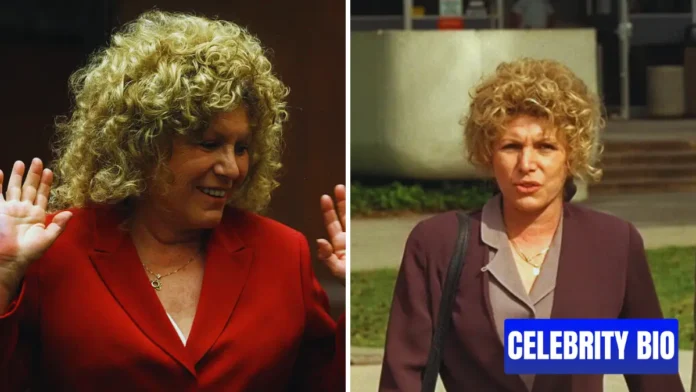The name Leslie Abramson carries weight in American legal history. Known for her fiery courtroom presence and uncompromising defense strategies, she became one of the most recognizable attorneys of the 1990s. Her reputation soared during the infamous Menendez brothers’ trial, where her passionate defense and aggressive tactics captivated the media and divided public opinion.
Abramson was more than just a lawyer; she embodied a new image of what a defense attorney could be—fearless, unapologetic, and willing to go to great lengths to protect her clients. For some, she was a champion of justice, fighting against a system stacked against defendants. For others, she crossed ethical lines, manipulating narratives and bending rules in ways that challenged professional standards.
This article explores Leslie Abramson’s life, from her early beginnings to her rise as one of America’s most talked-about defense attorneys. We’ll look closely at her most famous cases, her unique courtroom style, the controversies that surrounded her, and her enduring legacy in the world of criminal defense.
Early Life and Background
Leslie Abramson was born on October 6, 1943, in Queens, New York. Growing up in a working-class family, she developed a sense of resilience and determination early in life. Her upbringing in the bustling and competitive environment of New York City gave her the toughness she later carried into the courtroom.
Abramson pursued higher education with a focus on law, attending Queens College for her undergraduate degree before moving on to UCLA School of Law. While her peers often gravitated toward corporate law or safer legal careers, Abramson was drawn to criminal defense. She believed in the fundamental right of every person—no matter how accused or vilified—to have a voice in court.
This conviction set the tone for her career. By the time she graduated, Abramson already knew she wanted to dedicate her life to defending those who others refused to stand by.
Building a Legal Career
Leslie Abramson began her legal career as a public defender in Los Angeles, an environment that tested her skills against some of the city’s toughest cases. Working in the Public Defender’s Office, she developed a reputation as a fearless advocate for the underdog.
Her early years taught her two things: first, that the justice system was often unevenly balanced, and second, that empathy combined with strategy could be a powerful tool in the courtroom. By the 1970s, Abramson had already handled hundreds of cases, ranging from minor offenses to serious criminal charges.
In 1976, she entered private practice, a decision that allowed her to take on more high-profile clients. Word of her aggressive style spread quickly, and within a few years, she was regarded as one of the most formidable defense attorneys in California.
The Menendez Brothers Trial
The case that cemented Leslie Abramson’s place in legal history was the trial of Erik and Lyle Menendez, two brothers accused of murdering their wealthy parents, José and Kitty Menendez, in Beverly Hills in 1989. The crime shocked America, and the subsequent trial became one of the first major courtroom spectacles of the television era.
Abramson defended Erik Menendez, crafting a controversial but powerful argument: the brothers had endured years of emotional, physical, and sexual abuse at the hands of their parents. She framed the killings not as cold-blooded murders but as acts of desperate self-defense after a lifetime of trauma.
Her cross-examinations were fiery, her speeches emotional, and her strategy relentless. Abramson famously clashed with prosecutors, often raising her voice, gesturing dramatically, and pushing the boundaries of courtroom decorum.
Though the first trial ended in a hung jury, the second trial resulted in both brothers being convicted of first-degree murder and sentenced to life without parole. Despite the outcome, Abramson’s performance made her a household name and a symbol of the increasingly blurred lines between justice and entertainment in the age of televised trials.
High-Profile Cases Beyond Menendez

While the Menendez case defined her public image, Leslie Abramson had already built an impressive legal portfolio. She had represented numerous defendants in murder and assault cases, many of whom were underdogs in the eyes of the justice system.
One of her early high-profile successes came in 1988, when she secured the acquittal of Dr. Khalid Parwez, a physician accused of murdering his son. Abramson’s ability to humanize her clients and dismantle the prosecution’s narrative became her hallmark.
These cases reinforced her reputation as an attorney who not only fought hard but also took on cases that other lawyers might shy away from due to their difficulty or moral ambiguity.
Style, Personality, and Courtroom Tactics
Leslie Abramson was often described as the “pit bull of the courtroom.” She embraced this persona, using it to intimidate opponents and rally juries to her side. Her strategies included:
- Emotional storytelling: She wove narratives that connected juries to her clients’ struggles.
- Aggressive cross-examinations: Abramson was known for dismantling prosecution witnesses with precision and ferocity.
- Psychological framing: She often brought in experts to highlight emotional or psychological factors influencing her clients’ actions.
- Charisma and theatrics: From her tone of voice to her body language, everything she did was calculated to make an impact.
These tactics won her admiration from many young lawyers but also drew criticism from judges and opposing counsel who felt she pushed too far.
Controversies and Criticism
Abramson’s career was not without controversy. Critics accused her of manipulating juries with overly emotional arguments. Some believed her courtroom theatrics undermined the seriousness of legal proceedings.
Her most serious professional controversy came during the second Menendez trial when she was accused of tampering with a witness statement. Although she denied any wrongdoing, the incident raised questions about whether her aggressive defense style occasionally crossed ethical lines.
Despite these criticisms, Abramson never wavered in her belief that her duty was to her clients above all else.
Media Presence and Public Image
The televised Menendez trial turned Leslie Abramson into a media figure. She appeared on talk shows, was interviewed in documentaries, and even inspired fictional portrayals in TV series and films.
Pop culture embraced her as both a hero and a villain. Some saw her as a courageous woman challenging a patriarchal system, while others painted her as a symbol of excess in the courtroom.
The fascination with Abramson was part of a larger cultural shift: the rise of the “celebrity lawyer” in the 1990s, a trend she helped define alongside figures like Johnnie Cochran and F. Lee Bailey.
Retirement and Life After the Spotlight
In the early 2000s, Leslie Abramson gradually withdrew from the spotlight. After decades of high-stakes cases and intense media scrutiny, she retired from practicing law.
Since her retirement, she has largely stayed out of public life, occasionally giving interviews or appearing in retrospectives on the Menendez case. She has focused on her personal life and avoided the media circus that once defined her career.
Though no longer active in the courtroom, Abramson’s name continues to appear in legal discussions and media portrayals of iconic trials.
Legacy in American Legal Culture
Leslie Abramson impact on the American legal system is undeniable. She was a trailblazer for women in criminal defense, proving that a woman could dominate in a field historically controlled by men.
Her legacy is twofold:
- Positive: She gave defendants a fighting chance and humanized them in the eyes of juries.
- Negative: She is remembered for controversies that raised questions about ethics and the line between zealous defense and misconduct.
Regardless of perspective, Abramson changed how defense attorneys are perceived, and her influence continues to inspire—and divide—legal minds today.
FAQs
Who is Leslie Abramson?
Leslie Abramson is an American criminal defense attorney, best known for defending Erik Menendez during the Menendez brothers’ trial in the 1990s.
What happened to Leslie Abramson after the Menendez trial?
She continued practicing law for several years before retiring in the early 2000s. Today, she lives a more private life.
Why was Leslie Abramson controversial?
She was criticized for her aggressive courtroom tactics and faced accusations of unethical behavior during the Menendez trial, though she denied wrongdoing.
Is Leslie Abramson still practicing law?
No. She retired from legal practice and is no longer active in court.
What is Leslie Abramson best known for?
She is best remembered for her passionate defense of Erik Menendez, which made her a household name during one of the most publicized trials in U.S. history.
Conclusion
Leslie Abramson career is a story of brilliance, passion, and controversy. From her beginnings as a public defender to her rise as one of America’s most famous defense attorneys, she consistently fought for her clients with unmatched tenacity.
The Menendez trial made her a celebrity lawyer, but it also brought scrutiny and criticism that followed her for years. Even so, her impact on legal culture—particularly for women in the courtroom—remains significant.
Love her or hate her, Leslie Abramson changed the way America views defense attorneys. She reminded us that justice is not always black and white, and that every defendant deserves an advocate willing to fight to the very end.

